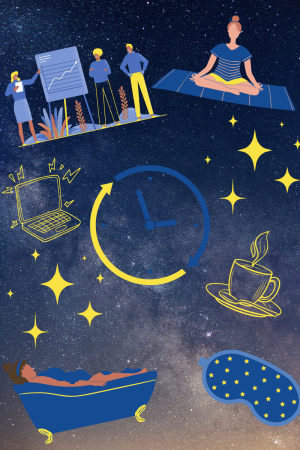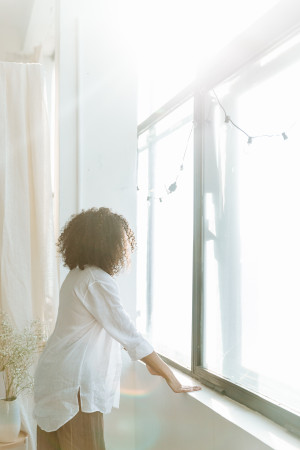6 Simple Ways to Reset your Sleep Schedule
You may have heard of the phrase, ‘internal body clock’. This is the biological schedule, or Circadian Rhythm, in our bodies that regulates the timings of bodily functions like eating, sleeping, and regulating temperature. This natural timekeeper runs in the background on a 24-hour cycle and is a key influencer of sleep. When our Circadian Rhythm works smoothly, we can expect unswerving, reliable sleep which is vital for our physical and mental health.

Unfortunately, it’s common for our Circadian Rhythm to get thrown off balance from time to time. Whether it’s working late, travelling or evening plans, our routine and consequently, our quality of sleep could be disrupted. When we are tired from disturbed sleep, we can feel stressed about how our low energy may affect our day. For instance, if you know you have an important work meeting the following morning.
Thankfully, re-setting your sleep schedule can help reduce stress and get you back on track.
The Relationship Between Sleep and Stress
Stress is our body’s natural reaction to a threat or feeling pressure from life’s demands. In small doses (acute stress) stress can be advantageous, like motivating you to complete tasks or keeping you safe when crossing a road. However too much, or prolonged stress can make you feel out of control, impact your mood, energy levels, and ability to function physically and mentally.
Poor sleep and stress are inextricably linked. The effects of bad sleep can be stressful, as you experience irritability and diminished concentration. Equally, the hormones adrenaline and cortisol are released during stress, activating the body’s ‘fight-or-flight’ response. This increases your heart rate and quickens breathing, preventing you from switching off and getting good quality sleep. You might find yourself tossing and turning, waking up frequently or staring at the ceiling unable to fall asleep at all.
By getting a decent number of undisturbed hours of sleep each night, our body has chance to repair and recharge. We also give our minds the time needed to process emotions and experiences from the day. We are better able to focus on a task and cope with the daily challenges that we face, such as getting stuck in traffic. Consequently, we are less likely to feel stressed and react to these demands disproportionately, with the fight-or-flight response.
Why is a Sleep Routine Important?
Any routine is beneficial in helping us feel secure, organised and in control. The very nature of unpredictability and ‘fear of the unknown’ is stress provoking. In addition, the tasks that make up our routine are often done so many times, we become good at them. What an easy way to boost your self-esteem!
We often hear about the importance of a sleep routine for young children, but the same applies for adults too. Consistency is key in helping your body and mind wind down for sleep. The more you implement routine steps, the easier it will become to allow yourself to relax, draw a line under the day, calm whirling thoughts and set yourself up for a better night’s sleep.
How to Reset Your Sleep Schedule
Stress at night is unfortunately very common. In fact, it’s thought that as many as 1 in 3 people within the UK struggle to get a restful night’s sleep1. Luckily, there are several ways to help reduce stress and enhance sleep quality.
1. Exposure to Light
Our Circadian Rhythm takes cues from light, so our mind knows that when it is dark it is usually time to sleep. Ensure your bedroom is dark enough with blackout blinds or an eye mask. This will signal to your brain and ‘body clock’ that it is safe to rest and reboot.
Equally, it’s important to get plenty of exposure to sunlight in the daytime as it contains Vitamin D. This crucial vitamin not only aids the health of our bones, but studies have shown that low levels of Vitamin D have been linked to lower levels of sleep quality and quantity2. Natural daylight to promote healthy sleep is more effective when exposure occurs directly outside. By exercising outside, you can boost your fitness while topping up your Vitamin D. Even small changes, like going for a walk on your lunchbreak could help.
You can also take steps to enhance natural light when you are indoors. If working from home, try to sit by a window to optimise daylight rather than relying on lamps or ceiling lights.
Another obstacle for sleep in our modern world comes from artificial light. Thanks to advances in technology, we are exposed to more artificial light usually during the evenings when we settle down and watch TV or scroll social media on our phones. This can disrupt our ‘internal clock’, as the artificial light from our electronic devices not only tells our brain that sleep time must be pushed back until darker hours3, but it can also suppress the hormone melatonin which regulates our sleep patterns4. Our body’s production of melatonin is strongly linked to the dark, so try avoiding screen time before bed as part of a healthy sleep routine. It can destabilise our sleep cycle by delaying the onset of sleep, as well as unsettling the quality or length of sleep5.
2. Relaxation Techniques
Try including some soothing habits into your bedtime routine. By giving yourself chance to unwind and release the tensions of the day, you will set yourself up for a more restful sleep. Think of it as stretching before exercise. You are aiming to prep your body and mind for sleep. Relaxing doesn’t come easily to most of us, so here are some techniques to help get you started. They are a great way to tackle the vicious cycle of stress and sleep that we mentioned earlier.
A. Breathing Exercises
Inhale through your nose, hold for a few seconds and slowly exhale through your mouth. Repeat until you notice your breathing has slowed and you feel calmer.
B. Meditation
Be still, focus on your breathing or visualise a calming place. This might be your favourite nature walk or holiday destination.
C. Yoga
Stretching your muscles gently can help relieve tension and reduce feelings of stress. Go nice and steady and don’t push yourself beyond what feels comfortable. The more you practice, the stronger and more supple you can become.
D. Bath
Having a bath doesn’t have to be an indulgence! Immersing yourself in warm water is soothing, uplifting and helps slow your breathing. You could incorporate some other techniques while you enjoy your soak, such as meditation, or add in some bath products with beautiful, natural aromas.
E. Reading
Getting lost in another world is a great way to distract a busy mind. It’s hard to pay attention to racing thoughts when building a picture in your head and follow a story! It’s a rare opportunity in today’s world to use your imagination and enjoy being quiet and still.
F. Listen to music
Tap into your mood directly through the power of music. It is incredibly influential on our minds, and can promote feelings of calm, happiness, and positivity.
Relaxation techniques help the body reverse the effects of stress and the fight or flight response. Enjoy the feeling of peace washing over you as you practice deep breathing, slowing down your heart rate and easing tension in your muscles. Looking after yourself after a busy day and practicing self-care should not be viewed as a luxury, but rather, a necessity for your emotional wellbeing.
3. Napping Habits
As tempting as napping is when you feel a lull in energy, it might not be the healthiest habit for your sleep schedule. Depending on when you take a nap and how long you nap for, you risk hindering your ability to nod off at bedtime. This is due to the type of sleep we experience throughout different stages of the sleep cycle. Napping for longer periods of time, later in the day is more likely to involve ‘slow-wave’ sleep, leaving you feeling groggy and strange upon waking. Whereas sleeping for an optimum duration of 10 minutes earlier in the day, will keep your nap in the earlier, lighter stages of the sleep cycle, preventing you from entering the later, deeper stages of sleep6.
4. Avoid Caffeine and Late Meals
Despite being an option in restaurants after an evening meal, it is wise to avoid coffee and other caffeinated drinks during the latter part of the day. Among the many hormones and chemicals in our bodies that influence sleep, adenosine is created and builds while we are awake. This could be why we sometimes feel we need more time in the morning to feel awake, as adenosine levels increase as the hours pass. Throughout the day as the amount of adenosine rises, the sleepier we feel as the onset of sleep is encouraged. Caffeine blocks this key chemical, disrupting our Circadian Rhythm and leaving us feeling alert and unable to fall asleep7.
Eating dinner too close to bedtime can also hinder your sleep. The body will struggle to rest and slow down for sleep while trying to digest a full meal! Many nutritionists would recommend leaving around 3 hours between your evening meal and going to bed8.

5. Regular Daily Exercise
Frequent physical movement can tire you out and bring the onset of sleep forwards, so you are less likely to have issues dropping off at bedtime. It’s important not to exercise too vigorously or too close to bedtime as this could make you feel more energised9.
Regular exercise can also enhance the quality of sleep you experience. The wonderful boost in the pleasure hormones (endorphins) that exercise gives you can improve emotional wellbeing by elevating your self-esteem and mood10. As such, we are better able to cope with stress and less likely to experience disturbed sleep from racing thoughts.
6. Bedroom Environment
It can help to create a sleeping environment that encourages comfort and calmness. One way to do this would be to keep your bedroom exclusively for sleeping. With the increase in working from home due to COVID-19, try and avoid working in your bedroom and consequently bringing work to bed with you! There can be a powerful association between your surroundings and how you feel.
Studies have also suggested that if your bedroom is free from clutter, you can expect a better night’s sleep. It can be difficult to feel in control when you are surrounded by mess, so try sleeping in a tidy environment to encourage a tidy mind11!
Keeping your bedroom dark with noise levels low can help support your body’s natural Circadian Rhythm. Try using ear plugs, white noise machines, eye masks and black out blinds. You can further optimise your sleep environment by keeping the temperature on the cooler side. Temperature is another cue used in our Circadian Rhythm that signals it’s time for sleep.
To improve sleep hygiene and the temperature of your bedroom, try closing your blinds throughout the day to keep heat out, turn down your thermostat and invest in breathable sheets and bedding.
When you create your sleep schedule, try implementing it consistently at the same time every night. This can help you manage daily stress by encouraging you to unwind, relax and prepare for sleep. You will also support your internal body clock by regulating your natural sleep cues. This should help you fall asleep quicker and enjoy the healthy, restorative quality sleep that you deserve.
1https://www.nhs.uk/live-well/sleep-and-tiredness/why-lack-of-sleep-is-bad-for-your-health/
2https://www.ncbi.nlm.nih.gov/pubmed/25581929/
3 https://www.sleepfoundation.org/bedroom-environment/light-and-sleep
4 https://www.nhs.uk/medicines/melatonin/
5 https://link.springer.com/article/10.1007/s11818-019-00215-x
6 https://www.sleepfoundation.org/how-sleep-works/does-napping-impact-sleep-at-night
7 https://www.sleepfoundation.org/nutrition/caffeine-and-sleep
10 https://www.bupa.co.uk/health-information/exercise-fitness/benefits-of-exercise

